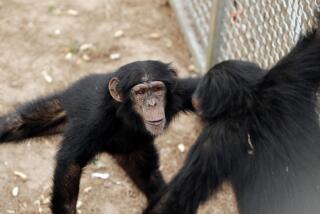What makes a chimpanzee a BFF? Trust, study finds
- Share via
Trust is the key to friendship — not just for humans, but for chimpanzees as well.
Elaborate experiments with chimps reveal that they often trust their BFFs to share a delicious snack. The same isn’t necessarily so when it comes to their mere acquaintances.
The findings, published this week in the journal Current Biology, suggest the roots of trust in human relationships go back quite a ways in evolutionary history, scientists say. Relying on others makes it possible for members of social species to work cooperatively for their survival.
Scientists have long observed that chimpanzees form strong bonds that look a lot like human friendships. Jan Maxim Engelmann and Esther Herrmann of the Max Planck Institute for Evolutionary Anthropology in Germany wondered whether trust played a role in these special relationships.
To find out, they sent four research assistants to the Sweetwaters Chimpanzee Sanctuary in Kenya, where they spent five months observing a group of 15 chimps. The researchers took notes on which chimps spent time grooming each other, touching each other and eating together. For each animal, they determined which chimp was his or her closest friend and which was the least favorite.
Next, they taught the chimps to play a game designed to measure their feelings of trust. Two chimps stood on opposite sides of a contraption that held boxes of food. One of the boxes contained two pieces of banana, which the chimps considered an OK snack. The other box held three pieces of banana and three pieces of apple, an unequivocally better snack.
Each chimp had a choice: Either take the so-so snack for himself or send the better snack to the other chimp. If he chose to be generous, his fellow chimp could thank him by sending some of the better snack back to his benefactor.
In a sense, the researchers explained, choosing the better snack amounted to trusting one’s fellow chimp to share some of the spoils. The animals made their choices by pulling ropes to send the boxes of food back and forth. (It sounds complicated, but 14 of the 15 chimps were able to figure it out.)
Each of the chimps got 12 chances to make this decision when paired with their bestie and 12 more turns when paired with their least favorite groupmate.
The researchers found that 11 of the 14 chimps were more likely to choose the better snack when they played the game with their BFF. Of the remaining three chimps, two were just as likely to share with their favorite friend as with their mere acquaintance. Only one (Cumbo) appeared to have more faith in his least-liked associate (Joy) than in his best buddy (William).
“Chimpanzees trust their friends more than their non-friends,” Engelmann and Herrmann concluded. “This finding provides evidence that chimpanzees, like humans, evolved robust forms of trust toward their close social partners, which might allow them to forge cooperative relationships.”
Engelmann, who specializes in studying cooperative social relationships, said the experiments suggest we humans are a little less exceptional than we might have thought.
“Human friendships do not represent an anomaly in the animal kingdom,” he said in a statement.
Follow me on Twitter @LATkarenkaplan and “like” Los Angeles Times Science & Health on Facebook.







